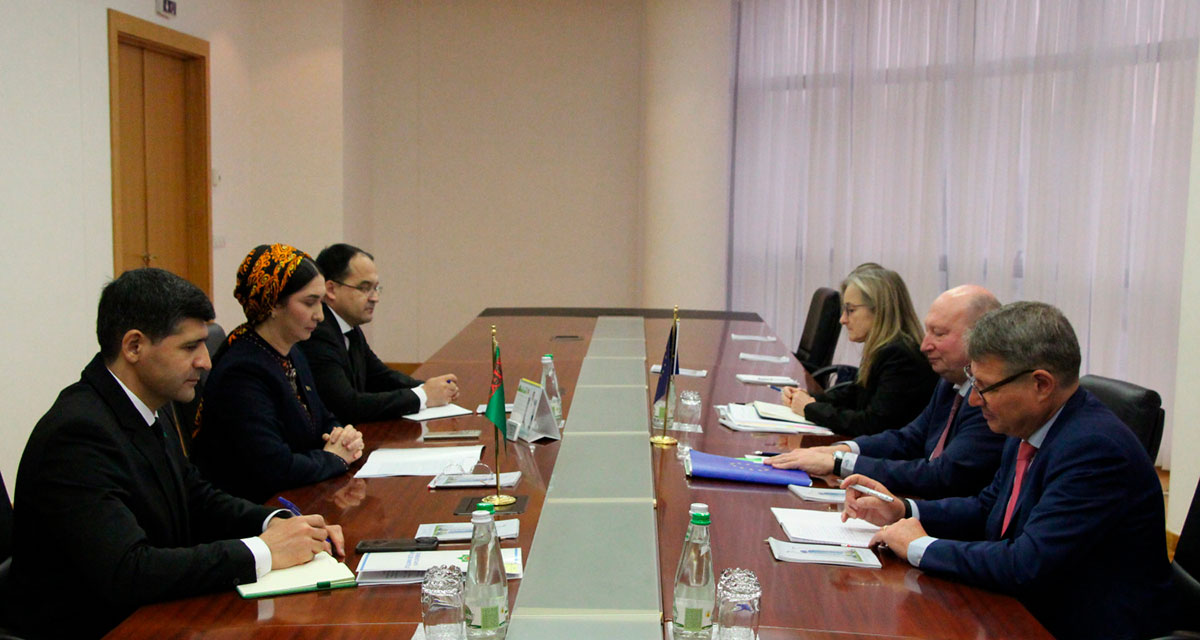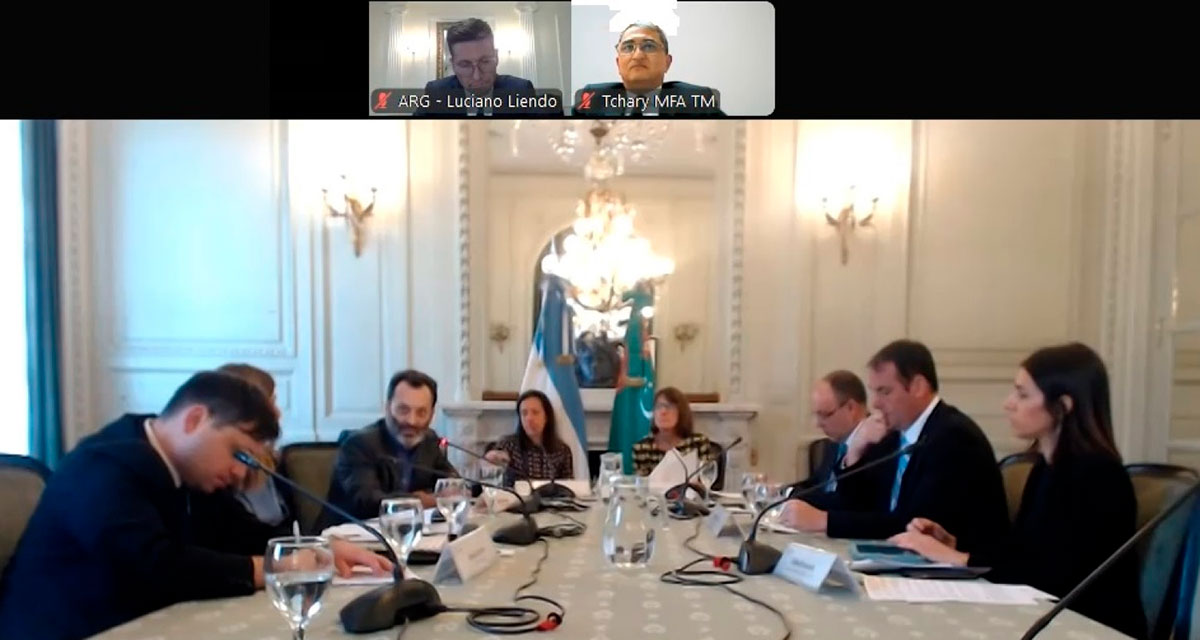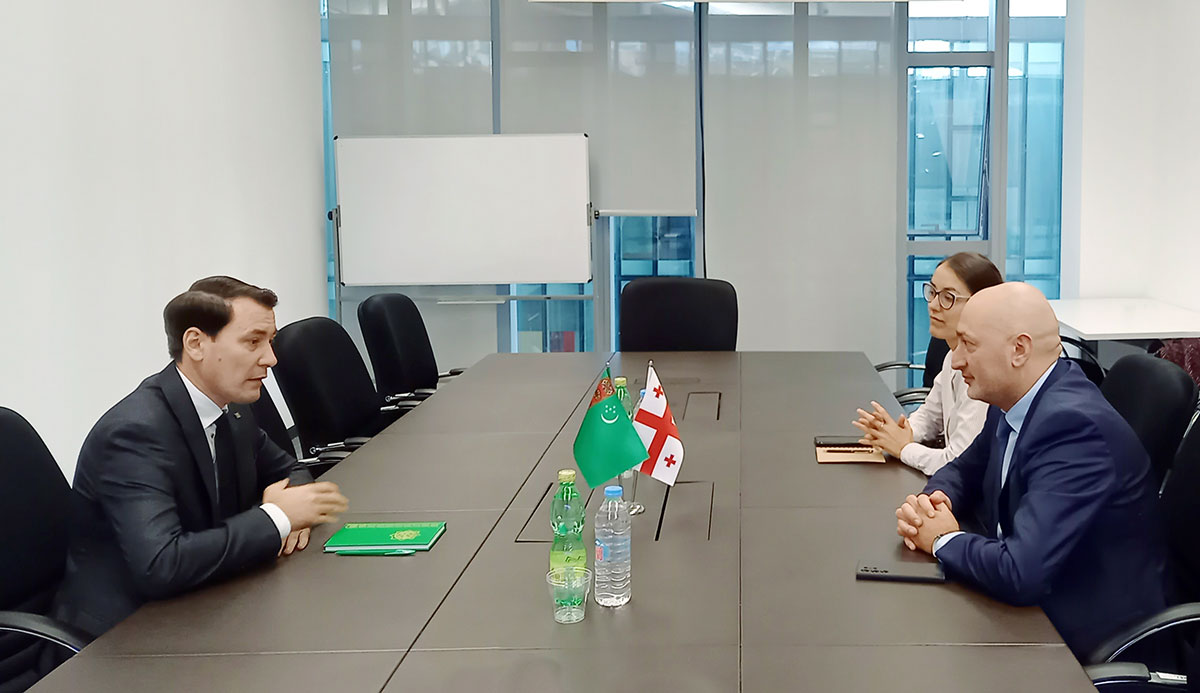A two-day seminar has opened in Ashgabat. Co-organized by the Government of Turkmenistan and the IOM office in Turkmenistan according to the adopted plan of activities, it aims to acquaint media workers with the international practice of combining efforts to prevent irregular migration and stop human trafficking.
Among those invited to attend the seminar were representatives of central and regional newspapers, magazines, television, radio, Internet mass media, and press services of government institutions. The main objective of the seminar run by international experts is to study the world practice of tackling the above-said global issues of today and to prevent them through the mass media.
Speakers at the open-discussion seminar highlighted that Turkmenistan has a wealth of positive experience of cooperation with IOM, which resulted in the setting up of a Working Group on Human Trafficking in early 2014. With the assistance of an international expert, the Group had worked out the 2016-2018 National Action Plan of Turkmenistan against Human Trafficking, which was approved by President Gurbanguly Berdimuhamedov’s Special Resolution in March 2016. The seminar participants noted that the document had directly contributed to ensuring human rights and freedoms, offering greater social and legal protection to the people, and improving the work ongoing in this field.
Turkmenistan sees migration, asylum support, and the protection of the rights of refugees and stateless persons as the key areas of cooperation with authoritative organizations. It is significant to note in this context that our country is strongly committed to its obligations and actively tackle the issues of migrants, refugees and stateless persons, both at national and international levels.
Thanks to its humanistic policy, independent neutral Turkmenistan has become a second homeland for citizens of a number of neighboring and other countries, who had to leave their native countries for some reason or other. In accordance with the universal international rules and the Turkmen nation’s time-honored traditions of humanism, our country makes everything necessary for a life of dignity for migrants, refugees and stateless persons.
As an eloquent testament stand the following facts and figures: more than 13,000 people (nearly 9,500 of whom were refugees) voluntarily received Turkmen citizenship and more than 3,000 people (1,800 of whom were refugees) were granted a residence permit in 2005; 4,000 people acquired Turkmen citizenship in 2011 and 2013; 786 people – in 2014; 361 people – 2015; 1,381 people – in 2016.
In accordance with the Decree signed by President Gurbanguly Berdimuhamedov on December 8, 2017, 1,690 stateless people: representatives of 21 nationalities, 1,165 adults and 525 children under 18, living permanently in our country, obtained Turkmen citizenship.
To comply with the Convention relating to the Status of Refugees and the Convention relating to the Status of Stateless Persons as well as to ensure the rights of refugees and stateless persons, who live in our country, a Resolution of the President of Turkmenistan approved new identity and travel documents of a refugee and a stateless person, as well as new residence permits.
The documents are in full compliance with the ICAO (International Civil Aviation Organization) standards. Along with that, our country has provided accommodation and employment for the refugees and has allocated land plots to those, living in rural areas. The refugees’ housing and social issues are being effectively tackled as well.
The varied program of the seminar enabled its participants to discuss a wide range of topics, including the mass media’s role in preventing human trafficking, ways to raise public awareness about today’s dangerous threats, cooperation between international organizations, state officials and non-governmental organizations in the field of irregular migration, and approaches of journalists to the coverage of the within-said issues.
Among those invited to attend the seminar were representatives of central and regional newspapers, magazines, television, radio, Internet mass media, and press services of government institutions. The main objective of the seminar run by international experts is to study the world practice of tackling the above-said global issues of today and to prevent them through the mass media.
Speakers at the open-discussion seminar highlighted that Turkmenistan has a wealth of positive experience of cooperation with IOM, which resulted in the setting up of a Working Group on Human Trafficking in early 2014. With the assistance of an international expert, the Group had worked out the 2016-2018 National Action Plan of Turkmenistan against Human Trafficking, which was approved by President Gurbanguly Berdimuhamedov’s Special Resolution in March 2016. The seminar participants noted that the document had directly contributed to ensuring human rights and freedoms, offering greater social and legal protection to the people, and improving the work ongoing in this field.
Turkmenistan sees migration, asylum support, and the protection of the rights of refugees and stateless persons as the key areas of cooperation with authoritative organizations. It is significant to note in this context that our country is strongly committed to its obligations and actively tackle the issues of migrants, refugees and stateless persons, both at national and international levels.
Thanks to its humanistic policy, independent neutral Turkmenistan has become a second homeland for citizens of a number of neighboring and other countries, who had to leave their native countries for some reason or other. In accordance with the universal international rules and the Turkmen nation’s time-honored traditions of humanism, our country makes everything necessary for a life of dignity for migrants, refugees and stateless persons.
As an eloquent testament stand the following facts and figures: more than 13,000 people (nearly 9,500 of whom were refugees) voluntarily received Turkmen citizenship and more than 3,000 people (1,800 of whom were refugees) were granted a residence permit in 2005; 4,000 people acquired Turkmen citizenship in 2011 and 2013; 786 people – in 2014; 361 people – 2015; 1,381 people – in 2016.
In accordance with the Decree signed by President Gurbanguly Berdimuhamedov on December 8, 2017, 1,690 stateless people: representatives of 21 nationalities, 1,165 adults and 525 children under 18, living permanently in our country, obtained Turkmen citizenship.
To comply with the Convention relating to the Status of Refugees and the Convention relating to the Status of Stateless Persons as well as to ensure the rights of refugees and stateless persons, who live in our country, a Resolution of the President of Turkmenistan approved new identity and travel documents of a refugee and a stateless person, as well as new residence permits.
The documents are in full compliance with the ICAO (International Civil Aviation Organization) standards. Along with that, our country has provided accommodation and employment for the refugees and has allocated land plots to those, living in rural areas. The refugees’ housing and social issues are being effectively tackled as well.
The varied program of the seminar enabled its participants to discuss a wide range of topics, including the mass media’s role in preventing human trafficking, ways to raise public awareness about today’s dangerous threats, cooperation between international organizations, state officials and non-governmental organizations in the field of irregular migration, and approaches of journalists to the coverage of the within-said issues.






